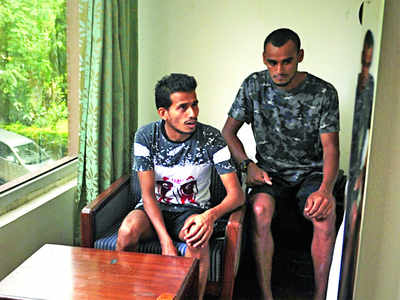- News
- Sports News
- Rio Paralympics: Ankur Dhama, India's first blind athlete
Trending
This story is from September 6, 2016
Rio Paralympics: Ankur Dhama, India's first blind athlete
Ankur Dhama's send-off will be epic. The 22-year-old, an MA student at Delhi University, will be the first blind athlete to represent India in the Paralympics - an achievement that's been 30 years in the making.

Ankur Dhama (left) with his guide Vipin Kumar. (TOI Photo)
Key Highlights
- Dhama will be the first blind athlete to represent India in the Paralympics.
- Dhama went completely blind over a week when he was around six years old.
- Dhama qualified for the Paralympics at the Asia-Oceania Championships in March this year.
NEW DELHI: Ankur Dhama's send-off will be epic. The 22-year-old, an MA student at Delhi University, will be the first blind athlete to represent India in the Paralympics - an achievement that's been 30 years in the making. The Blind Relief Association will see him off on August 31, when he leaves for the Brazilian city of Rio de Janeiro. If he qualifies in the heats, he will compete in the 1,500 metre final on September 13.
Dhama, a St Stephen's College graduate, has a personal best of in 4:17 minutes over the distance, which he recorded at Sonepat last July.He hopes to shave five seconds off that in Rio. "If it's a very slow race, I don't mind leading. But if it's only slightly slow, I'll pick up pace in the last 200 metres," says Dhama of how he is approaching the race. However, he and his coach will finalise the strategy only at Rio.
For the blind, middle-distance running is a team sport. Vipin Kumar, a 20 year-old Nagpur University student, will keep Dhama on track - tied literally to him with a rope. No pushing or dragging is allowed. A high level of coordination is necessary, says coach Satyapal Singh, a Dronacharya Award winner and teacher at Acharya Narendra Dev College. He explains, "Four legs have to function as two and two pairs of arms as one. The slightest mismatch will lead to injuries."
Dhama acknowledges, "You can't do anything without a guide." Kumar, from a farming family in a village near Modinagar, met Dhama in 2011. They have run more races together than they care to count. "To be a guide, I have to be 10 seconds faster than the runner. I compete independently and with him," says Kumar. His support extends beyond the track. He has helped Dhama find his feet at camps, stadiums, athlete housing and dining halls across the world. It's a huge responsibility, Kumar concedes, that is paid for in friendship.
"It has taken 30 years to get here," says KC Pande, vice-chairman of the Indian Blind Sports Association. "We began organising sports meet when sport for the blind meant three-legged and potato-races." The association tightened its participation policies and in 1998, became a member of International Blind Sports Association, adopting global norms and standards.
Dhama, a St Stephen's College graduate, has a personal best of in 4:17 minutes over the distance, which he recorded at Sonepat last July.He hopes to shave five seconds off that in Rio. "If it's a very slow race, I don't mind leading. But if it's only slightly slow, I'll pick up pace in the last 200 metres," says Dhama of how he is approaching the race. However, he and his coach will finalise the strategy only at Rio.
For the blind, middle-distance running is a team sport. Vipin Kumar, a 20 year-old Nagpur University student, will keep Dhama on track - tied literally to him with a rope. No pushing or dragging is allowed. A high level of coordination is necessary, says coach Satyapal Singh, a Dronacharya Award winner and teacher at Acharya Narendra Dev College. He explains, "Four legs have to function as two and two pairs of arms as one. The slightest mismatch will lead to injuries."
Dhama acknowledges, "You can't do anything without a guide." Kumar, from a farming family in a village near Modinagar, met Dhama in 2011. They have run more races together than they care to count. "To be a guide, I have to be 10 seconds faster than the runner. I compete independently and with him," says Kumar. His support extends beyond the track. He has helped Dhama find his feet at camps, stadiums, athlete housing and dining halls across the world. It's a huge responsibility, Kumar concedes, that is paid for in friendship.
While living in Baghpat in UP, Dhama went completely blind over a week when he was around six years old. Once his family reconciled themselves to the reality that no surgery would resurrect his vision, he was sent to JPM Senior Secondary School for the Blind on Lodhi Road in the capital. Dhama thrived on the school's strong sporting culture, and started competing internationally. It was a start that culminated in two bronzes and a silver at the Asian Para Games in 2014. He qualified for the Paralympics at the Asia-Oceania Championships in Dubai in March.
"It has taken 30 years to get here," says KC Pande, vice-chairman of the Indian Blind Sports Association. "We began organising sports meet when sport for the blind meant three-legged and potato-races." The association tightened its participation policies and in 1998, became a member of International Blind Sports Association, adopting global norms and standards.
End of Article
FOLLOW US ON SOCIAL MEDIA











